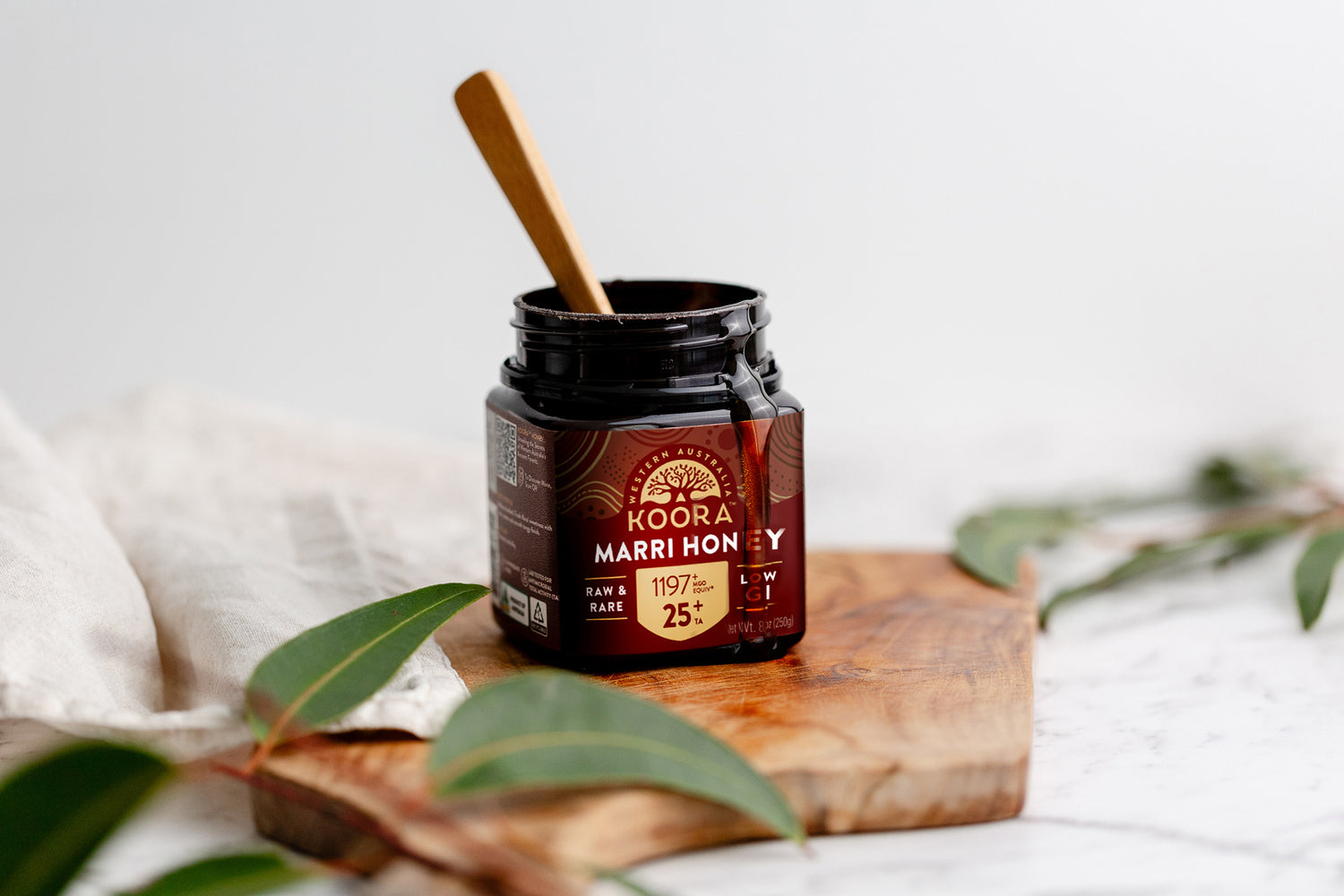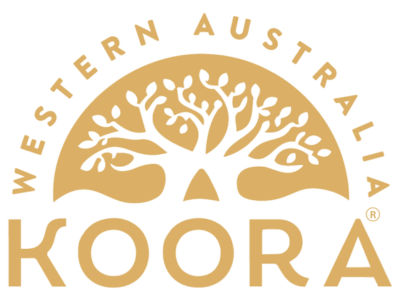FAQs
These rare Jarrah and Marri honeys are harvested from Jarrah and Marri trees respectively in different seasons at different times of the year. In fact Jarrah honey is harvested every 2-4 years as the trees bloom only in the right climatic conditions. These trees are native and endemic (meaning that it does not exist in any other part of Australia or the world) to the south-western region of Western Australia. Each tree produces a unique type of nectar that results in distinct honey varieties and taste profile.
While raw honey is generally safe for adults and children over the age of one, infants below 12 months of age should NOT consume raw honey due to the risk of botulism.
Pregnant or nursing mothers should consult their doctor before use.
No. they are not pasteurized or ultra heat treated. Pasteurization destroys all the wonderful antimicrobial, antioxidant properties of the honeys. They are filtered from some pollen and other residues of the bees or hives but are never pasteurized, ensuring that they retain their natural enzymes, antioxidants, and nutrients.
Basically, the higher the heat, the more the nutritional value of the honeys are reduced or destroyed.
We highly recommend that when you are making a cup of tea, make sure it is cooled to about 60 deg C/ 140 deg F before adding the honeys. Truth be told, for most nutritional benefits of teas to be retained, and to avoid tea leaves getting “burnt”, you should never add boiling water to tea. Adding milk or some slightly cool water will help cool your tea down faster, after steeping your tea, so that our honey can be added.
You may warm and reset your jar of honey in a bowl of hot (not boiling) water. Once the crystals start to melt, and it becomes liquid, remove it so that the temperature of the honeys does not cross 40 deg C (104 Deg F). Please do not microwave honey as the goodness in the honey will be completely destroyed.
However our Jarrah honey resists crystallization and does not crystallize like all other honeys so you can enjoy smooth tasting honey all the time!
We highly recommend having one to two teaspoons in the morning every day as it naturally is to enjoy the benefits of Koora honey. Koora honey can be used as natural sweeteners in beverages (not more than 140 deg F or 60 deg C), drizzled over morning breakfast like toast, yogurt, oats, muesli, over desserts, incorporated into dressings, or simply enjoyed by the spoonful.
We do not recommend using Koora Honey for baking or cooking as all its wonderful compounds and antimicrobial properties will be destroyed with high heat.
We recommend a spoonful before bedtime to help ease into a good night’s rest.
For recipes and other uses, please follow us on our socials on FB, IG, TT and PIN @KooraHoney
KOORA Jarrah and Marri honeys are rich in antioxidants and have powerful antimicrobial properties. They support immune health, soothe sore throats, aid digestion, and promote overall wellness.
Key benefits include:
- Lab-certified Total Activity (TA) for unmatched antimicrobial potency
- Naturally low GI—no sugar spikes or crashes
- Rich in antioxidants and anti-inflammatory compounds
- Prebiotics for gut health
- Amino acids that enhance collagen production for skin and joints
- Naturally occurring tryptophan to support restful sleep
For full benefits, visit the product pages for Jarrah TA35+ and Marri TA25+.
Yes! KOORA honeys can be applied topically to moisturize skin, soothe minor burns, and help with eczema or psoriasis or even bruises. Their high TA rating enhances antimicrobial effectiveness. They also contain amino acids that support collagen production for youthful, glowing skin. Dilute with water before applying directly.
Store the honeys in a cool, dry place at room temperature away from sunlight. Ensure the lid is tightly closed to maintain freshness and prevent any crystallization setting in early.
TA stands for Total Activity—a scientific measure of the honey’s antimicrobial potency. Every batch of KOORA honey is independently lab-tested and certified for its TA rating. The higher the TA, the stronger its ability to fight bacteria and support immunity. Unlike Manuka honey, KOORA’s antimicrobial strength is derived from hydrogen peroxide, not methylglyoxal (MGO), making it a safer choice for long-term health.
Our test certifications are now available at our Menu section "TA Test Certificates"-
Every KOORA jar includes a batch number printed on the label. To verify its certified Total Antimicrobial Activity (TA), simply match the numeric portion of your batch code (e.g., the digits after “XX” or standalone numbers like “12345”) with the test certificate listed on our website. At KOORA, we guarantee that the actual lab-certified TA of your honey is always higher than the TA printed on the label. That means every spoonful delivers even greater antimicrobial potency than advertised—backed by science and verified through independent testing.
KOORA honey has a naturally low glycemic index (GI) of just 46—lower than Manuka, clover, and buckwheat honeys. This means it causes a slower, more stable rise in blood sugar, making it a smarter sweetener for those managing diabetes or pre-diabetes.
Disclaimer: KOORA honey is still a natural sugar and should be consumed in moderation. We recommend one to two teaspoons per day, preferably straight from the spoon, as part of a balanced diet. Always consult your healthcare provider for personalized dietary advice. For more details please refer to our Disclaimer section in the footer.
KOORA Jarrah and Marri honeys offer up to 90% greater antimicrobial potency and 3x more antioxidants than average Manuka honey. Plus, KOORA is peroxide-based—not MGO-based—avoiding the potential vascular and metabolic risks associated with MGO (methylglyoxal) in Manuka.
Learn more about how Koora Honey is better than Manuka in so many ways here.
There are studies that show the DANGERS with MGO derived potency in Manuka. A 2017 study concluded that: “It is undeniable that MGO accumulation has harmful effects on vascular function, by inducing insulin-resistance, hypertension, atherosclerosis, neurodegenerative disease and diabetic microvascular complications.”
(Click here to learn more about the Dangers of Methylglyoxal (MGO) - The Hero Ingredient in Manuka Honey)
Koora Honey is a safer, more effective superhoney for everyday health.

Can’t find what you are looking for?
Explore our blog, or buzz us. Our team is here to help you!



